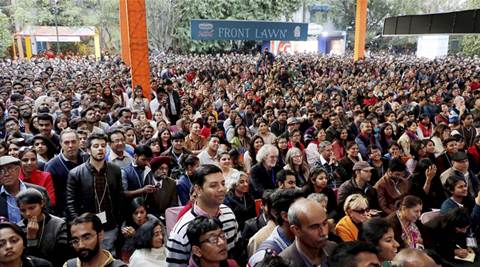The Jaipur Literature Festival (JLF), often dubbed the “greatest literary show on Earth,” has become a cultural juggernaut since its inception in 2006. Co-founded by Namita Gokhale and William Dalrymple, the festival held annually in Jaipur, Rajasthan, has grown from a modest gathering of 18 writers to a global phenomenon attracting over 300 speakers and thousands of attendees. While JLF is celebrated for its vibrant celebration of literature, its rise to fame has been equally fueled by controversies and gossip, earning it a reputation that some might playfully suggest aligns more with a “Jaipur Gossip Festival.” Yet, under Namita Gokhale’s stewardship, JLF has carved a unique space among the world’s literary festivals, drawing an elite crowd and fostering intellectual discourse. This article explores how controversies have shaped JLF’s identity, examines the role of gossip in its allure, and celebrates Gokhale’s contributions to its global standing.
The Birth of JLF: A Vision for Literary Dialogue
The Jaipur Literature Festival began as a small literary segment within the Jaipur Heritage International Festival, launched by Faith and John Singh in 2006. Inspired by events like the Edinburgh Festivals, Namita Gokhale and William Dalrymple envisioned a platform to bring together Indian and international writers, fostering dialogue across languages, cultures, and genres. The inaugural event, held at the Diggi Palace, featured 18 writers, including Hari Kunzru, Shobhaa De, and Gokhale herself, with a modest crowd of about 100 attendees, some of whom, as Dalrymple humorously noted, “appeared to be tourists who had simply got lost.”
Gokhale, an award-winning author of 23 works, including the cult classic Paro: Dreams of Passion (1984), brought a deep passion for storytelling and inclusivity to JLF. Her vision was to create a space where Indian literature, particularly in regional languages, could stand shoulder-to-shoulder with global voices. This commitment to diversity—evident in sessions conducted in Hindi, Bengali, Tamil, Rajasthani, and more—has been a cornerstone of JLF’s appeal.
Controversies: The Fuel of Fame
While JLF’s literary offerings are its heart, controversies have often been its megaphone. The festival’s open and inclusive ethos, which encourages free speech and diverse perspectives, has frequently sparked debates that transcend the literary realm, drawing media attention and public scrutiny. These controversies have not only amplified JLF’s visibility but also cemented its reputation as a platform unafraid to tackle contentious issues.
One of the most notable controversies occurred in 2012, when Salman Rushdie was scheduled to attend JLF. His presence reignited debates over his controversial novel The Satanic Verses, leading to protests by religious groups and political pressure. Ultimately, Rushdie’s session was canceled, and he expressed disappointment at India’s failure to protect free expression, stating, “Religious extremists can prevent free expression of ideas at a literary festival, in which the politicians are too, let’s say, in bed with those groups…for narrow electoral reasons.” The incident sparked global headlines, highlighting JLF’s role as a battleground for free speech and censorship.
In 2013, sociologist Ashis Nandy stirred another storm with remarks at JLF about corruption among Dalits, tribals, and OBCs. His comments were perceived as offensive, leading to a criminal case and demands for action. While Dalit-Bahujan scholar Kancha Ilaiah took a conciliatory stance, suggesting Nandy’s remarks were a “bad statement with good intentions,” the controversy kept JLF in the spotlight. Police even asked organizers, including Gokhale and Dalrymple, to remain in Jaipur until the investigation concluded.
These incidents, among others, have fueled perceptions of JLF as a hotbed of controversy. Critics argue that the festival’s high-profile nature and elite guest list make it a magnet for polarizing figures and debates. Yet, Gokhale and Dalrymple have defended JLF’s commitment to open dialogue, with Gokhale stating in 2013, “The message is clear. Don’t reject someone without hearing them.” This willingness to engage with contentious issues has distinguished JLF from more sanitized literary festivals, contributing to its global allure.
The Gossip Factor: A “Jaipur Gossip Festival”?
The playful moniker “Jaipur Gossip Festival” captures another facet of JLF’s identity: its ability to generate buzz through the mingling of literary luminaries, celebrities, politicians, and socialites. The festival’s vibrant atmosphere, set against the backdrop of Jaipur’s historic charm, creates a fertile ground for gossip—both literary and social. From whispered rivalries between authors to sightings of Bollywood stars and political heavyweights, JLF’s social scene is as much a draw as its intellectual offerings.
Namita Gokhale’s novel Jaipur Journals (2020) brilliantly satirizes this aspect of the festival. Set at JLF (though not explicitly named), the novel features characters like Rudrani Rana, an elderly spinster who sends cruel anonymous notes, and Raju Srivastava, a cat burglar turned bestselling poet. Gokhale’s sharp wit skewers the pretensions of the “glittery set” that throngs JLF, from self-important authors to name-dropping socialites. The book’s depiction of festival regulars—some based on real figures like Shashi Tharoor and Javed Akhtar—adds a layer of insider gossip that delights readers familiar with JLF’s ecosystem.
This gossip-driven allure is not merely frivolous. It reflects JLF’s unique ability to blend high culture with popular appeal. The festival’s free admission (with some ticketed events like the Jaipur Music Stage) ensures a diverse crowd, from students to literary elites, creating a melting pot where ideas and egos collide. Social events, like cocktail parties hosted by figures like Tarang Arora of Amrapali Jewels, further amplify JLF’s reputation as a place to see and be seen. Arora noted a “30% spurt” in business during JLF, underscoring the festival’s economic and social impact on Jaipur.
Namita Gokhale: The Architect of JLF’s Success
At the heart of JLF’s rise is Namita Gokhale, whose multifaceted role as author, publisher, and festival director has been instrumental in shaping its identity. Gokhale’s literary credentials—spanning novels, short stories, mythology, and Himalayan studies—lend her curatorial choices authenticity and depth. Her commitment to inclusivity is evident in JLF’s multilingual sessions and its emphasis on amplifying marginalized voices, particularly women’s and regional language writers.
Gokhale’s vision extends beyond Jaipur. She has been a driving force behind JLF’s international editions in the United States, the United Kingdom, Canada, Australia, the Maldives, and Spain, transforming the festival into a global brand. Her ability to balance literary rigor with accessibility has made JLF a platform where Nobel laureates like J.M. Coetzee and Orhan Pamuk share the stage with emerging Indian authors.
Her leadership during challenging times, such as the COVID-19 pandemic, further highlights her resilience. When the world shut down in 2020, Gokhale spearheaded JLF’s pivot to a digital platform with the “Brave New World” series, garnering over 4.5 million views and reaching 21 million people. The 2022 hybrid edition, held at Hotel Clarks Amer after years at Diggi Palace, was a testament to her adaptability.
Gokhale’s personal touch is also evident in her advocacy for literary community. She has spoken of the “sense of community and shared energies” in live literary events, a principle that informs JLF’s inclusive ethos. Her efforts have inspired over 60 literary festivals across India, as noted by Sanjoy Roy, Managing Director of Teamwork Arts, JLF’s production company.
JLF’s Place Among Global Literary Festivals
Despite its controversies and gossip-laden reputation, JLF’s literary credentials are undeniable. Recognized as Asia’s largest and most prestigious literature festival, it attracts over 300 speakers annually, including Nobel laureates, Booker Prize winners, and global thinkers. The 2025 edition, held from January 30 to February 3 at Hotel Clarks Amer, featured luminaries like André Aciman, Jenny Erpenbeck, and Geetanjali Shree, alongside discussions on topics from Gandhi’s legacy to economic ideas shaping the future.
JLF’s global reputation is enhanced by its commitment to free speech and cultural exchange. Unlike many literary festivals, it resists “echo chambers,” as Gokhale notes, showcasing diverse voices, especially young and regional ones. The Jaipur BookMark (JBM), JLF’s B2B networking platform, further strengthens its influence by connecting publishers, authors, and agents worldwide.
Compared to festivals like the Edinburgh International Book Festival or the Hay Festival, JLF stands out for its scale, accessibility, and cultural vibrancy. Its free sessions and multilingual focus democratize literature, while its controversies and star-studded guest list ensure media coverage that rivals global counterparts. However, critics argue that JLF’s elite crowd and occasional sensationalism risk overshadowing its literary mission, a tension Gokhale navigates with finesse.
A Literary Carnival with a Gossip Twist
The Jaipur Literature Festival is a paradox—a celebration of ideas and a cauldron of controversies, a haven for book lovers and a stage for gossip. Its rise to global prominence owes much to Namita Gokhale’s vision, which has transformed a modest gathering into a cultural landmark. While controversies like the Rushdie and Nandy episodes have thrust JLF into the spotlight, they also underscore its commitment to free expression. The gossip, satirized in Gokhale’s own Jaipur Journals, adds a layer of allure that draws diverse crowds, from students to celebrities.
As JLF continues to evolve, its ability to balance literary depth with popular appeal will define its legacy. For now, it remains a festival where words spark debates, egos clash, and stories unfold—proving that, whether called the Jaipur Literature Festival or the ‘Jaipur Gossip Festival,’ it is an unparalleled celebration of the human experience. Congratulations to Namita Gokhale for crafting a literary phenomenon that, controversies and all, has earned its place among the world’s great festivals.





